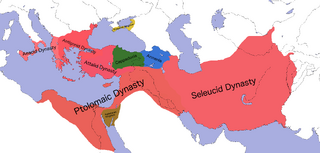
Division of Alexander's Empire by 320 BC.
The Diadochi were the generals and statesmen that divided Alexander's empire following his death in 322 BC. Alexander had rapidly earned his reputation as the greatest military mind the Western world had seen thus far and had conquered all the way to the borders of India before turning back. While he intended to consolidate his realm and even planned additional conquests, he died before he could make his wishes a reality. His son and heir, Alexander IV, was only a year old and thus clearly not able to take the throne for himself. The commander of the Companion Cavalry, Perdiccas, was elected as the regent who would rule until Alexander IV came to age. However, he was assassinated only two years after. With mutual distrust growing, Alexander's former generals and commanders squabbled amongst themselves for the imperial throne and as a result none of them managed to take the entire empire. They were successful in carving out sections of territory for themselves, but no single ruler would be able to reunite the empire, though many would try.
When the empire first split, there were five different states that emerged that directly claimed to be the legitimate heir of Alexander's empire and were Greek in nature. They are as follows:
- Ptolemy held the largest realm, having control over Syria, Mesopotamia, and Egypt and the two cities of Buchephala and Alexandria.
- Seleucus held the lands of Persia, Media, Bactria, Sogdiana, and a small part of the Indus.
- Attalus held much of Greek held Anatolia.
- Antigonus held Macedonia, much of eastern Greece, Thrace, and parts of northern Anatolia.
- Aeacides held much of western Greece and much of southern Italy and Sicily.
These borders consistently shifted as wars between these successors were common with the goal of unification. Of all these successors, the only one that seemed to have little interest in pursuing unification were the Attalids. Pyrrhus, son of Aeacides, was perhaps the closest to unifying the empire again, holding the territories of his father as well as taking much of the Antigonid territory. He also seized Egypt from Ptolemy and placed Alexander IV as a pretender. Alexander consolidated his rule in Egypt and laid claim as another Diadochi, given that he was the son of Alexander the Great.
Other realms broke off from the empire but did not consider themselves to be successor's of Alexander's legacy; some even resented the Greek conquest in the first place. Nabataea and the Bosphoran colonies re-established their independence while Armenia and Cappadocia sprung into being and carved out powerful states of their own.
While no single Greek ruler was able to reunify the lands that Alexander had conquered, many had claimed to be the legitimate heir to his glory and legacy. Few actually had the strength to make it possible but many tried and many failed as a result. No single state would occupy the territory that Alexander had conquered until the height of the Roman Empire nearly four hundred years later.
